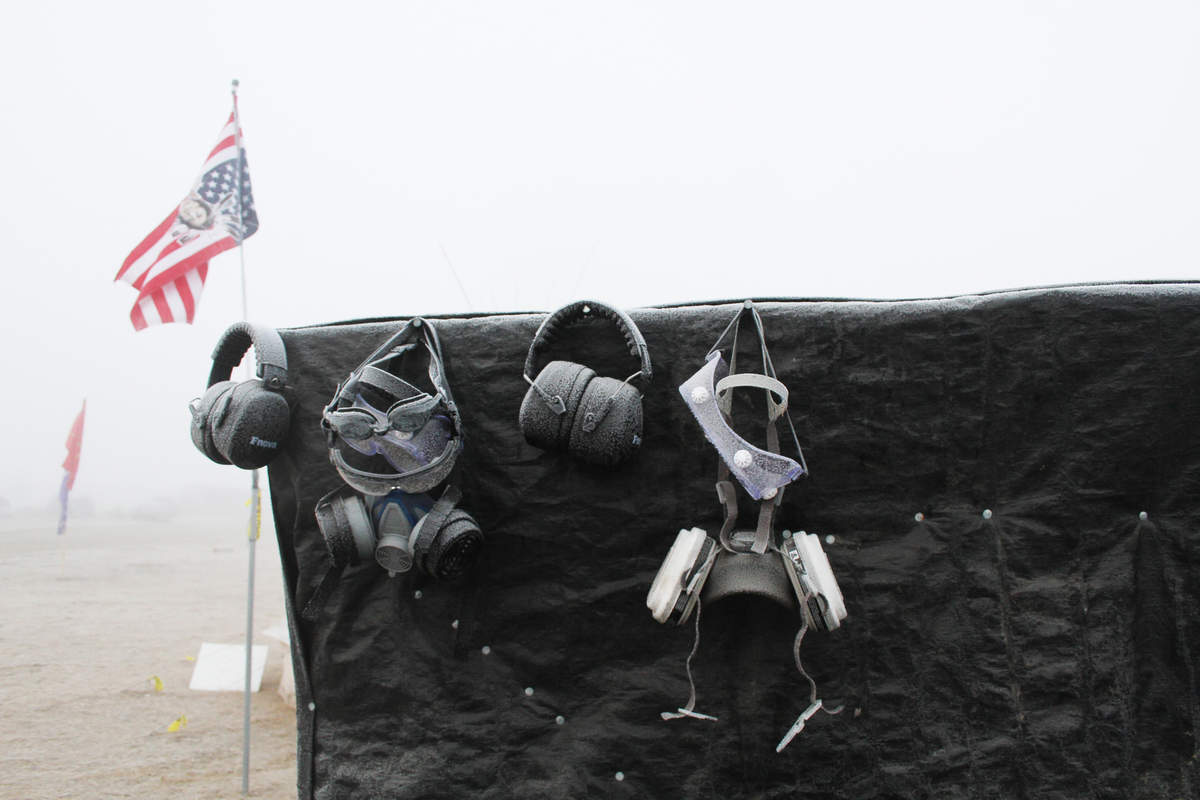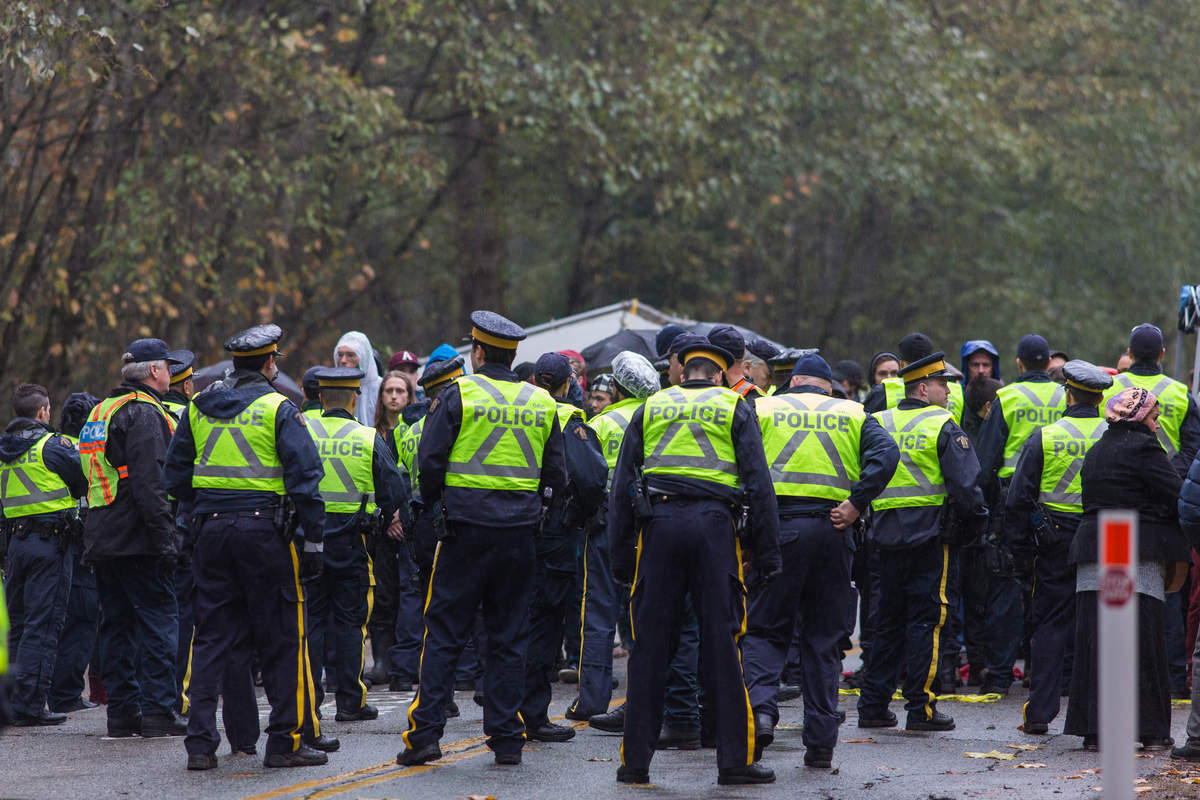
‘North of North’ star Anna Lambe believes (most) people can change
From True Detective to The Grizzlies, the Inuk actor is known for badass roles. She's...
The battle against the Kinder Morgan Trans Mountain pipeline could lead to the next Standing Rock and destroy any investment case for the project, according to a newly released report.
The report, commissioned by the Secwepemc nation and prepared by the Indigenous Network on Economies and Trade, is titled “Standing Rock of the North: The Kinder Morgan Trans Mountain Pipeline Expansion Secwepemc Risk Assessment.”
Over the course of 35 pages, it articulates seven ways that Kinder Morgan Canada has failed “to account for the lack of political, legal, and proprietary certainty surrounding the pipeline.”
“The government has to follow the minimum standards laid out in the United Nations Declaration on the Rights of Indigenous Peoples — that includes free, prior and informed consent, which they have not gotten from us for the project,” Kanahus Manuel, member of the Secwepemc Women Warrior Society and daughter of the late Art Manuel, told The Guardian.
“Instead Kinder Morgan is hiding the risks and the costs their backers will face when this pipeline doesn’t get built.”
Canada and B.C. have both committed to implementing the United Nations Declaration on the Rights of Indigenous Peoples, also known as UNDRIP. A central component of UNDRIP is an adherence to “free, prior and informed consent,” meaning consent that is attained without coercion or manipulation, with plenty of notice and makes sure that detailed information is provided. There’s plenty of debate in Canada about how UNDRIP can actually be implemented, but in the meantime governments are talking the talk without always walking the walk.
Here’s a breakdown of the key points.
The proposed Trans Mountain expansion pipeline (referred to as TMEP in the report) would transport 890,000 barrels of oil per day from Edmonton to Burnaby and plans to cross 518 kilometres of Secwepemc territory, which accounts for about half of the pipeline’s entire length.
The problem?
The Secwepemc nation never ceded, released or surrendered their land to the British Crown or Canadian state. That’s the case in much of British Columbia. The original pipeline was first built in 1951, when Indigenous peoples weren’t allowed to organize on land issues or hire lawyers.
But it’s now 2017. And that matters a great deal given the Secwepemc nation unreservedly opposes the pipeline.
In June, the nation declared: “We the Secwepemc have never provided and will never provide our collective consent to the Kinder Morgan Trans Mountain Pipeline Project. In fact, we hereby explicitly and irrevocably refuse its passage through our territory.”
The Secwepemc have a very lengthy track record of fierce resistance and direct action. In 1995, sundancers and other land defenders engaged in a month-long standoff with 400 RCMP officers, now known as the Gustafsen Lake standoff.
Other examples of resistance include the Sun Peaks Resort camp from 2000 to 2010, the Women Warrior Society camp in 2015 against Imperial Metals following the Mount Polley mining disaster and ongoing opposition to KGHM’s Ajax Mine.
Secwepemc people are more than ready to fight to protect their lands and waters.
“In their words, the pipeline will never be built,” said report co-author and economist Troy Cochrane in an interview with DeSmog Canada.
“They will not allow it to come onto their land. If we’re taking them at their word, then the pipeline is doomed from the get-go. If the government is going to respond to this on-the-ground confrontation of the pipeline coming onto the territory, who knows where that could go. I shudder to think about those possibilities.”

Protestors at Standing Rock faced violent clashes with private security forces. Photo: Dark Sevier via Flickr
There are currently 18 distinct legal proceedings against the project.
That includes six against the National Energy Board’s recommended approval, nine against the decision by the federal cabinet to approve it, three against the B.C. government for its decision to accept the federal review process and another two from Indian Tribes in Washington State for potential impact of significantly increased tanker traffic on endangered southern resident killer whales.
The first round of hearings started in early October in front of the Federal Court of Appeals. Because of the size of the case, it includes over 10 applicants including seven First Nations. As noted in the report: “The legal risks for the proposed Kinder Morgan TMEP therefore are extremely high.”
Another related aspect emphasized in the report is that Secwepemc people operate with a “principle of collective land tenure” that contradicts Western conceptions of land ownership.
Because Kinder Morgan and the various levels of government only consulted with elected band councils as opposed to the collective nation, the report contends they “failed at the most basic and primary threshold when it comes to negotiating with the proper title and rights holders to discharge constitutional obligations.”
Throw in the landmark 2014 Supreme Court of Canada case between the Tsilhqot’in Nation and British Columbia, and there’s a pretty strong argument to be made that the legal system could make Kinder Morgan’s life very difficult.
It was less than two weeks ago that TransCanada cancelled its massive proposed Energy East Pipeline, mostly due to sustained low oil prices.
The same fate could befall Kinder Morgan’s project.
“Historically, pipeline companies have been considered relatively safe, stable investments,” the report noted. “However, since 2015, the market has treated pipelines as a riskier investment.”
This has had direct consequences for Kinder Morgan’s revenue, which peaked in 2014 and has been dropping ever since. But the report contends that the economic situation could get much more dire for Kinder Morgan following the “Secwepemc’s assertion that they will defend their land, and the recently launched Tiny Houses campaign.”
Every month that the project is delayed costs the company over $5.6 million. In addition, the total anticipated project cost has increased by almost a full one-third, from $5.4 billion in 2012 to $7.2 billion last year.
“Whether Kinder Morgan knows or is ignorant, the actual risk associated with investments in this project are totally out of line with what the real risks are, and the real risks are all compounded by the realities of Indigenous land rights and the possibility of direct action to defend their territory,” Cochrane said.
The BC Liberals went to bat for the Trans Mountain pipeline for many years.
Sure, it committed in early 2016 to requiring five key conditions be met before allowing it to proceed. But despite having the opportunity to order a provincial environmental assessment, it chose to accept the federal National Energy Board’s assessment as its own through an “equivalency agreement.”
That meant that it gave up the chance to seriously re-evaluate the environmental ramifications of the project.
How times have changed. The newly elected B.C. NDP government, propped up by the provincial Greens, have committed to doing everything it can to stop the Kinder Morgan project. In August, the new government announced it was seeking intervener status in legal challenges to the project, appointing the legendary lawyer Thomas Berger to head up the charge.
In addition, the new government has pledged to implement the United Nations Declaration on the Rights of Indigenous Peoples (although, to be fair, both the federal Liberals and Alberta NDP have done the same without much to show for it).
As the report put it: “The political terrain is shifting rapidly in the province and Indigenous peoples are positioned to play a central role.”
Will #KinderMorgan‘s #TransMountain #Oilsands Pipeline Become the #StandingRock of the North? https://t.co/Foalru9aXK #cdnpoli @james_m_wilt
— DeSmog Canada (@DeSmogCanada) October 18, 2017
Names like TransCanada and Enbridge have become well-known in Canadian water cooler talk.
Same goes for Kinder Morgan. Especially since Trudeau appointed a ministerial panel to review the project and subsequent ignored all of its incisive recommendations.
“Kinder Morgan’s plan to build a pipeline that passes through Indigenous territory, and also a densely populated city known for its environmentally conscience citizens, puts the company at the centre of these conflicts,” the report argues. “By doing so, it has become one of a handful of pipeline companies that are household names.”
A continued push to build the pipeline by Kinder Morgan could add to that negative reputation, especially in the face of fierce Indigenous opposition and potential police or military intervention as implied by Natural Resources Minister Jim Carr.
More negative attention could lead to more public pressure to cancel the project, itself impacting the economic bottom line.
The Kinder Morgan pipeline received a recommended approval from the National Energy Board, and the go-ahead from federal cabinet.
But the report contended that impending overhauls of the National Energy Board, Canadian Environmental Assessment Agency and Fisheries Act could have an impact on the pipeline.
That’s especially given the federal government’s announcement of “interim review principles” in January 2016, which included a commitment to “undertake deeper consultations with Indigenous peoples and provide funding to support participation in these consultations.”
This creates what the report dubs a “significant risk” for the project given the failure to uphold that commitment.
“Changes to legislation are expected sometime in the fall of 2017 and there is evidence to suggest that they will have a significant influence on subsequent decision-making and licensing processes related to the TMEP and route approval process — especially where Indigenous rights, title, jurisdiction, and consent are involved,” the report said.

Protesters and members of the RCMP clashed near the site of survey work for the Trans Mountain pipeiine being conducted on Burnaby Mountain, November 2014. Several protesters were arrested. Photo: Mark Klotz via Flickr
In May, Greenpeace Canada filed a complaint with the Alberta Securities Commission about Kinder Morgan’s disclosure of climate-related risk.
It was the first such submission in Canada, following in the wake of Occidental Petroleum being required by asset manager BlackRock to disclose such risks. Adam Scott of Oil Change International said that he’s also watching closely for the full report by the Canadian Securities Administrators on climate change risk disclosure practices.
Such pushes also helped establish the groundwork for the final reason in the report: that Kinder Morgan’s pipeline will directly undermine Canada’s climate targets. As recently reported by the commissioner of the environment and sustainable development, Canada is currently projected to overshoot its 2030 target by 55 per cent.
Barring incredible technological innovations that cut per-barrel emissions, it seems impossible at this point for the country to do anything but stabilize and then decrease oilsands production. As a result, this threatens fossil fuels with the potential future status of “stranded assets,” meaning that investors will massively lose out if climate targets are taken seriously.
“When Canada gets serious, the Kinder Morgan TMEP will never pass inspection if run through the climate change global and national commitments necessary to save the planet as an inhabitable place for all,” the report concluded.
Content for Apple News or Article only Get the inside scoop on The Narwhal’s environment and climate reporting by signing up for our free newsletter. This...
Continue reading
From True Detective to The Grizzlies, the Inuk actor is known for badass roles. She's...

Artist Alison McCreesh’s latest book documents her travels around the Arctic during her 20s. In...

I’ve watched The Narwhal doggedly report on all the issues that feel even more acutely...
